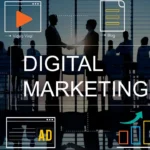Office No. 608, Lunkad Sky Station, Viman Nagar Road, Pune, Maharashtra 411014, India
Phone: +1 213-261-0597
contact@techthinkmarketing.com
Table of Contents
ToggleIntroduction
In today’s fast-paced digital landscape, advertising creatives are no longer just visuals—they’re the voice of your brand, the hook that captures attention, and the force behind clicks, shares, and conversions. Whether you’re a small business owner, marketer, or content creator, mastering ad creatives can dramatically improve your campaign performance.
In this blog, we’ll explore what advertising creatives are, why they matter, key elements of high-performing creatives, types of formats, and expert tips to boost your ad ROI.
What is an Advertising Creative?
An advertisement refers to scenes, lessons and/or audio materials used in creative marketing campaigns. This includes your Facebook advertising banner, Instagram Reel, Google Display ad, copies in your e -mail marketing. This is the message and the medium that directly talks to your target audience.
Examples of advertising creative:
Products showing a Facebook Hindola
A fun Google Search Advertising title
A ticket that is undergoing a product video
A labeled banner ad on a blog
Why Are Ad Creatives Important?
With millions of ads competing to be aware of the web, your creative first impression – and often, is your only chance. A well -designed advertising creative:
Draws attention within 2-3 seconds
Immediately communicates value
Encourages clicks, engagement or sales
Brand misses
Even the best media plan will fail without strong advertisements. According to a study of Nielsen, about 50% of the advertising campaign is in creative quality success.
Core Elements of a Great Advertising Creative
Here are the essential ingredients to craft an ad that performs:
- Clearly target
Are you selling? What potential customers make? An event market? Each creative must match a clear goal. - Target group insight
Know who you are talking to. Use language, visuals and emotions echo with your buyer personality. - Strong idea
Whether it means an image, illustration or visual appeal. Empty colors, high opposite and eye movements help to prevent rolls. - Copy Explain
Selling words. Use short, porous, beneficial language. The headlines should attract attention; CTAs (call for action) should be clear. - Brandstability
To create self -recognition and recognition, use constant writing, color, logo and tone in Creative. - Mobile Customizing
With more than 70% advertising traffic from the smartphone, Creative should look good on the small screen.
Types of Advertising Creatives
Depending on goals and stage, here are popular formats:
- Stable picture
Best for: Facebook, Instagram, performs advertising
Pro: to make early
Tip: Use lifestyle shots, product image or bold typography - Khindola -advertising
Best for: Facebook, LinkedIn, Instagram
Pro: Perform many features or products
Tip: Tell a story in the frame - Video ad
Best for: YouTube, Tiktok, Meta, Ott
Pro: high engagement rates
Tip: Hook -audience during the first 3 seconds - Animated gifs
Best for: E -Post campaign, Instagram Stories
Pro: light and attractive
Tip: Use profits in a loop - Text -based advertising
Best for: Google -Search, Twitter/X
Pro: Users with high intentions
Tip: Test many headlines and CTA
Data-Driven Creative Optimization
Don’t rely on guesswork. Use analytics to determine what works:
- A/B Testing: Compare variations of the same ad
- Heatmaps: See where users click or hover
- Engagement Rates: Track likes, shares, comments
- CTR (Click-Through Rate): Higher CTR often means your creative message is resonating
Platforms like Meta Ads Manager and Google Ads offer real-time creative performance insights.
Final Thoughts
A winning ad campaign begins with a winning creative. It’s the fusion of psychology, art, and data. Whether you’re running ads on Meta, Google, TikTok, or LinkedIn, the creative you use determines how people perceive your brand and whether they act.
By understanding your audience, crafting powerful visuals and messaging, and continuously testing and optimizing, you’ll not only improve performance—but build long-lasting brand equity.





